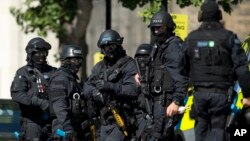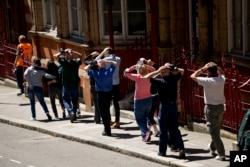Britain has pledged a tough response after last Friday’s terror attack in Tunisia that killed up to 30 British tourists. The attack came just days before the 10th anniversary of the bomb attacks on London’s transport network.
Security services are having to shift the focus of their counterterrorism operations overseas.
In eerily realistic scenes, three gunmen shoot their way into a London metro station. Outside, bodies lie in the street. Britain’s emergency response is put to the test as police, fire and ambulance units rush to the scene. The two-day drill taking place this week is designed to mimic recent attacks in Paris and Sydney.
For many Londoners, it’s also a grim reminder of events 10 years ago — the July 7 bombings that targeted the city’s transport network.
"Tragically after 7/7, of course we took the learning, we adapted our policies and our procedures. But styles of attack, they also change, and we have to evolve and make sure that we're ready and we have the right skills to be able to respond," said Maxine De Brunner, deputy assistant commissioner of London’s Metropolitan Police.
Security services said the drill was not done in response to Friday’s attack in Sousse, Tunisia, that killed at least 38 people, the majority of them British.
Survivors have been returning to emotional homecomings. Bodies are also being repatriated.
British Prime Minister David Cameron vowed a tough response.
“First we must give our police and security services the tools they need to root out this poison," he said. "We must be stronger at standing up for our values and we must be more intolerant of intolerance.”
But the heart of counterterrorism is shifting overseas, said Raffaello Pantucci of the Royal United Services Institute.
“The ideology is such now that it basically says, ‘You attack Westerners wherever you can find them and whatever they look like.’ And so whatever target becomes possible, becomes a potential target," he said. "The problem is that multiplies the number of potential targets, and in a huge number of potential countries.”
Tunisia’s President Beji Caid Essebsi admitted Tuesday that security services were taken by surprise. He said the security forces made provisions for the month of Ramadan but never thought problems would occur on beaches where tourists are.
Cameron has not specified the policies that will form his response to the Tunisia attacks. It must involve working with overseas allies, said Pantucci.
“It has to be about building local capacity, because that’s the main lever that you have," he said. "All you can really do is help develop the locals so that they are able to respond to their domestic threat more effectively.”
At home, lawmakers have pledged to tackle what they call "poisonous ideology." London mayoral candidate Tessa Jowell — a minister at the time of the 7/7 attacks — said the city has become more united in the decade since.
“Killers fantasize about religious wars while Muslims break their fast in London synagogues; they imagine a city divided while all faiths march together at London Pride,” Jowell said.
Britain’s security services say a domestic attack is highly likely; they are well-drilled in their response. But the attack in Tunisia underlines the limits of their abilities to protect nationals overseas.

